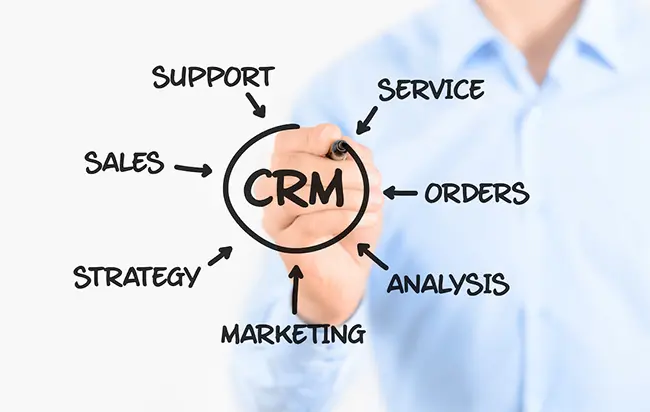When asked to name their biggest challenge, one in two insurance agents reported “lead generation” as their biggest challenge. But it’s not always not having enough leads, sometimes it’s managing all of them. To help overcome both, many insurance agencies are investing in new technologies.
CRM software is one such technology designed to help businesses, like insurance agencies, manage their customer relationships. Hence the name, Customer Relationship Management (CRM).
It’s seen a major popularity boost over the last couple of years and is expected to reach $128 billion by 2028, which is a big leap from 2020’s $52 billion. Moreover, it makes for a compound annual growth rate (CAGR) of a whopping 12.1%.
But why is CRM software becoming so widespread, especially in the insurance industry?
CRM Systems Help Insurance Agents to:
- Easily stay on top of all contacts and other data.
- Complete actions automatically, such as sending emails and scheduling calls.
- Improve communication with leads and among agents, internally and externally.
All in all, CRMs bring about higher team efficiency and productivity, enabling businesses to optimize the whole sales process, from start to finish.
A good CRM tool should not only enhance the satisfaction and experience of existing clients but also help agents successfully bring in new clients and retain those too. A good CRM software also helps insurance agencies easily scale up when new leads start coming in.
Let’s see how CRM software helps insurance agents generate and manage leads through the entire sales pipeline.
How CRM Software Benefits Insurance Agencies and Generates Leads
There are many CRM tools to choose from today. And they vary significantly in terms of their features and functionalities, as well as pricing. Make sure to check out everything the market has to offer to find a CRM that best suits your insurance agency’s needs. You don’t want to be switching between different programs, as it’s time-consuming and unnecessary when you can do it all in one place.
In general, an effective CRM tool should enable you to do the following, thereby helping you generate leads, make your teams more productive, and increase your sales:
1. Data and Contact Management
CRM software provides a secure, centralized database with all you might need to manage your insurance business.
There’s no need for endless spreadsheets or worse, physical papers and file cabinets. You can store all your information safely in the cloud and make it easily accessible to every agent in your company.
For instance, to locate a specific contact, simply search the client’s name in the database and all your notes and contact information pulls up in no time. You can see the past interactions you’ve had with them, previous claims, quotes, policies, etc. More importantly, you can see where each lead is in the sales funnel, i.e., how close they are to making a purchase.
All this readily available knowledge helps you prioritize and make better decisions in the future. What’s more, you’ll be quicker about it than ever before. CRM software allows you to effortlessly organize and pull up documents and policies.
This point is especially important for the high-risk insurance industry, which as you know, deals with plenty of confidential information on a daily basis.
2. Task and Employee Management
CRM software can also completely eradicate your need for outside calendars and planners. Using only the platform, you can manage all employees, see what they’re up to, assign tasks, and even direct leads to available agents for fast communication.
Such a tool would allow you to solve issues and respond to client queries quickly. As a result, your insurance company would provide top-notch customer service.
Another great thing about CRMs is that they can send you reminders and notifications for upcoming lead calls, appointments, renewals, meetings, events, even birthdays. Most CRMs will also allow you to make direct phone calls from the platform, send emails, texts, etc. As you don’t have to deal with multiple devices and apps at once, you can save precious time.
During 2020’s pandemic, CRM tools proved to be quite useful, if not mandatory. They allowed insurance agents and many others to continue doing their business remotely.
Naturally, ever since then, the demand for CRM software has skyrocketed, as business owners realized the importance of digitization. According to ZDNet’s reports, 77% of sales experts claimed their businesses had undergone an immense digital transformation since 2019.
3. Automation of Tasks
CRM can not only speed up and facilitate the sales process but also take over some tasks completely, not needing human supervision at all.
Other than sending reminders when they are due, your CRM software can automatically contact leads via email, text message, or even social media in some cases. As an example, you can set the software to send an automatic welcome text to every person who reaches out to you requesting more information.
Cold calling is difficult when done by hand. But when they are timely, appropriate, and directed toward qualified leads, cold calls can effectively turn prospects into buyers.
Obviously, it can’t close deals for you, but, CRM software can help you identify good opportunities by tracking each lead and their behavior. And when combined with automated text messaging, it can send texts to incoming leads for you.
4. Sales Reports and Predictions
Finally, with your CRM software, you can also easily create reports for each lead. Some programs will even generate them for you automatically. Most of them also have analytics tools that can help you make use of all that data.
By learning from past reports, you can make more accurate sales predictions in the future. Basically, you’ll know when and where to direct your marketing efforts and increase their chances of being successful each time.

What Makes a Good CRM Software for Insurance Agencies?
Of course, every business’s needs are different. Insurance agencies in particular have very specific needs.
When shopping around, check out all options and take advantage of free demos and consultations. Here are a few things you should be on the lookout for when it comes to CRM software:
- Ease of use. Ideal CRM software should feel intuitive. You don’t want to spend ages learning how to set up and use some overly complicated system — or teaching others how to use it.
- Ease of integration. Perhaps you didn’t have an effective system before and your data is scattered across multiple locations. It’s especially useful if you get a business intelligence automation integration. In that case, you’ll need a CRM system that integrates with your existing platforms, so you can easily migrate over.
- Customizability and scalability. You should also be able to fully personalize your CRM, adjusting it to suit the needs of your insurance agency specifically. Similarly, it should allow you to effortlessly upgrade and scale up.
- Availability on multiple platforms. Today, more than half of all Internet traffic comes from mobile phones. Thus, mobile versions are now must-haves in every business.
- Proper data security. Given that you’re working with sensitive data, you need a CRM that will keep it safe no matter what. Thankfully, most of the leading CRMs are cloud-based and well-protected.
- Features and functions. Obviously, a good CRM for insurance agents should have plenty of features. It should enable them to do as many tasks as possible in one place.
- 24/7 customer support. Unfortunately, even the best software can sometimes have glitches. When that happens, you should be able to contact customer support and resolve the issue quickly to prevent costly setbacks.
What Is the Best CRM Software for Insurance Sales?
When it comes to CRM software, there are few that do it better than DYL. Our CRM omnichannel solution serves all sorts of industries, and has worked with insurance agencies for over a decade.
It’s everything you need for streamlined and efficient lead generation and contact management, all in one place. What’s more, it’s all displayed in a simple drag-and-drop dashboard you’ll learn to use in no time with our onboarding team and support.
DYL’s software provides you with all the features your insurance agency needs to attract prospects and convert them into buyers. For instance, you can connect with leads instantly and in real-time using our Web-to-Lead Capture and Email-to-Lead-Capture features.
You can also manage your leads and contacts, easily schedule follow-ups, hop on conference calls, and even listen to call recordings afterward. Despite all that, DYL’s CRM software doesn’t cost an arm and a leg.
For a reasonable monthly fee, you’ll receive access to all our features, no hidden costs involved. In addition, you can request a live demo tour from our reps by completing the form on our website.
That way, you’ll know exactly if DYL is the right fit for your insurance company before you commit to it.
In Conclusion
All in all, customer relationship management software like DYL can improve your lead generation practices and streamline your workflow, no matter what industry you’re in.
CRM provides an all-in-one digital solution and real-time database that your insurance agency can utilize to connect with leads more efficiently and identify the ones that are worth your marketing efforts.
That way, you can save both time and money and direct your attention to leads that are likely to convert.
If you decide to give CRM software a go, make sure to choose carefully. For starters, opt for a provider that offers a wide selection of features relevant to your insurance business, preferably with business phone service integrated, for a seamless sales and support experience.
In addition, data protection and constant technical support are a must if you want to prevent unnecessary incidents. Finally, to allow you to generate leads efficiently, your CRM software should be easy to use, available on various devices, and help you easily detect, manage, and contact potential clients.
How do you currently generate and manage your leads? Let us know in the comments. And if you have any ideas for future articles, write us at feedback@dyl.com. We’re always looking for new ideas!
